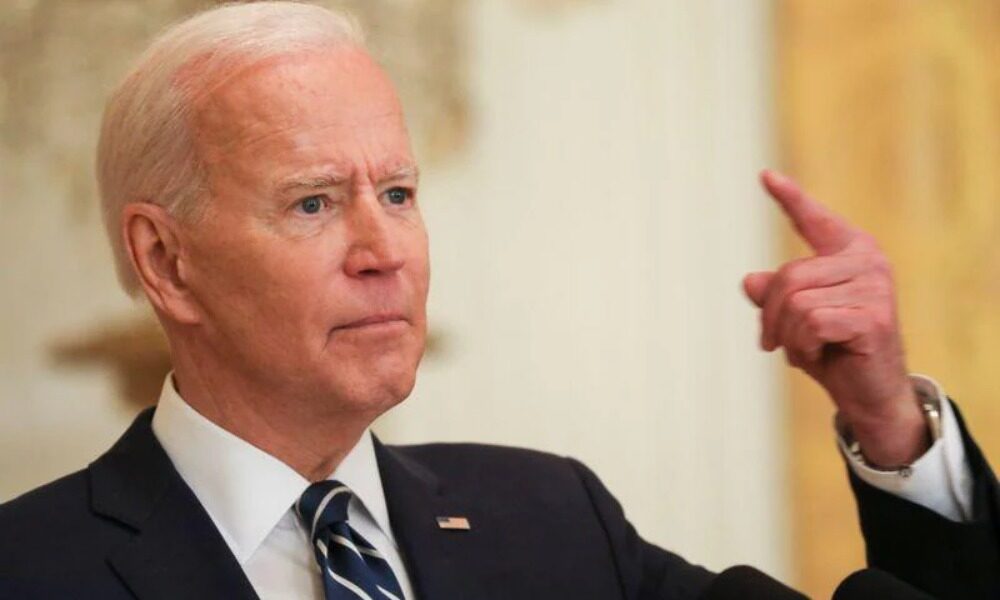Latest News
Biden says ‘May 1 deadline’ is hard in terms of tactical reasons

U.S. President Joe Biden on Thursday at the first formal White House news conference of his presidency said that it would be “hard” to withdraw the last U.S. troops from Afghanistan by a May 1 deadline, but he added that he did not think they still would be there next year, Reuters reported.
Biden comments come as his administration strives to build international pressure on the Taliban and U.S.-backed Afghan President Ashraf Ghani’s government to reach a peace agreement and a ceasefire before the deadline.
According to Reuters report peace talks, however, are stalled and by suggesting U.S. troops would be gone next year, Biden risked weakening Ghani’s bargaining hand and encouraging the Taliban, who U.S. officials say have stepped up violence in their quest to oust him, to play for time, some analysts said.
During the news conference Biden said it would be hard to meet the May 1 deadline to withdraw the last 3,500 U.S. troops “just in terms of tactical reasons.”
“It’s gone be hard to meet May 1 deadline in terms of tactical reasons hard to get those troops out,” Biden told reporters.
He apparently was referring to the enormous logistical challenges of pulling out the roughly 10,000 American and foreign troops and their equipment within the next six weeks.
Biden was asked if it was possible that there still would be U.S troops in Afghanistan next year. “I can’t picture that being the case,” he responded.
The Taliban have indicated they could resume attacks on foreign troops if Biden does not meet the May 1 deadline.
The deadline was set in a February 2020 deal struck with the Taliban under former President Donald Trump.
It called for a phased conditions-based drawdown of U.S. troops from America’s longest war. The Taliban were required to prevent Islamist militant groups such as al Qaeda from using Afghanistan as a base from which to attack U.S. and allied targets.
Trump, however, ordered the drawdown to proceed even though violence escalated, U.S. officials said the Taliban had failed to cut ties with al Qaeda and disputes delayed the start of the intra-Afghan talks on a ceasefire and a settlement to decades of strife.
Washington, meanwhile, has yet to act on its commitment to have U.N. and U.S. sanctions on senior Taliban leaders lifted.
The Taliban deny they are responsible for the surge in bloodletting or that there are al Qaeda fighters in Afghanistan.
Biden noted that Secretary of State Antony Blinken has been in Europe meeting with U.S. allies that have troops in Afghanistan and “if we leave, we are going to do so in a safe and orderly way.”
“The question is how and in what circumstances do we meet that agreement that was made by President Trump to leave under a deal that looks like it’s not being able to be worked out to begin with,” Biden said.
“We will leave. The question is when we leave,” he added.
U.S. peace envoy Zalmay Khalilzad, who negotiated the withdrawal deal for Trump and was kept on by Biden, has circulated a U.S.-drafted peace proposal that would replace Ghani’s government with an interim power-sharing administration.
Ghani repeatedly has rejected stepping aside, saying any transfer of power would have to take place through elections as required by the constitution. Taliban officials have said they would not participate in an interim government, but would recommend members.
Biden comments comes after former US National Security Advisor HR McMaster said on Wednesday night he is very concerned about the withdrawal of troops from Afghanistan and felt it could result in a “catastrophe” for the Afghan people and for the region.
Speaking at a Hoover Institute debate, McMaster said this “so-called responsible end of the war in Afghanistan, which I think could be catastrophic not only for the Afghan people but for the people of the region, for Europe; and also result in increased risk from Jihadist terrorist organizations”.
McMaster said he would like to ask President Joe Biden about the “resurrection of the language of responsible end of the war”. He said this term was last used in 2011 regarding the Iraq withdrawal.
“Of course we know what happened a couple of years later with the rise of ISIS there,” he said adding whether Biden was, as such, concerned “about replicating that experience in Afghanistan in a way that creates a humanitarian catastrophe.”
